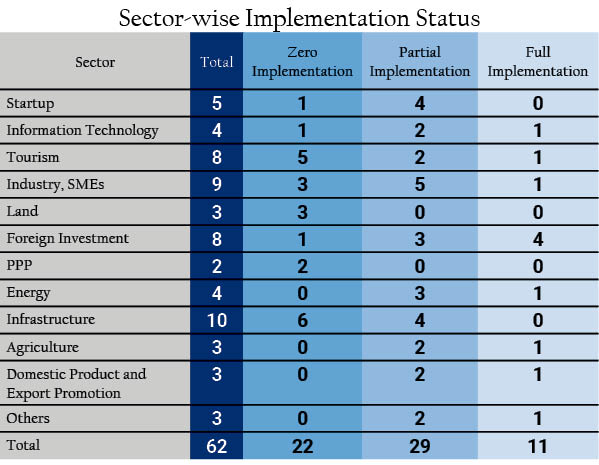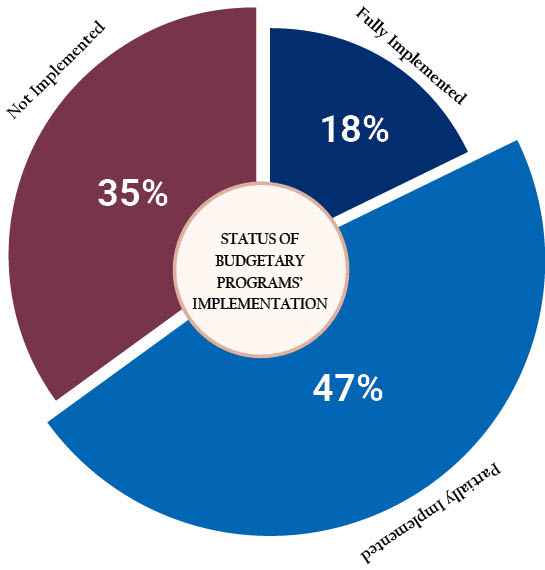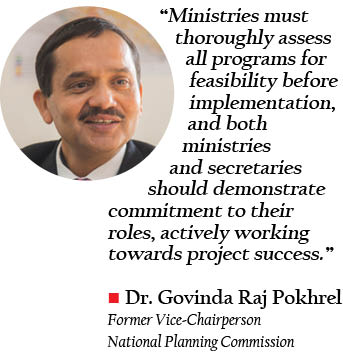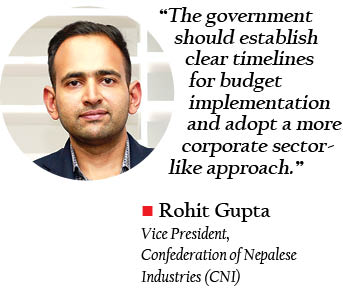A study conducted by CNI has found that only 18 percent of the announcements made in the federal budget have been fully implemented by the government agencies in the last fiscal year while there was zero progress in 22 economic sector programs.
 the HRM
the HRM
Before the finance minister unveils the annual budget, it has become customary for the apex bodies of the private sector to present a set of their anticipated requirements to the government, as the business community members aim to have the suggestions included in the country’s financial blueprint. Additionally, they engage in vigorous lobbying efforts with the finance minister and other high officials of the ministry to influence policies that align with their business interests, often with success.
This trend became particularly evident in the previous two fiscal years when alterations were made to customs duties for sponge iron and electric vehicle imports, favoring specific business entities.
However, when it comes to promoting the broader concerns of the private sector, every budget has fallen short, with the government struggling to successfully execute the programs and incentives delineated in these financial plans.
Despite the inclusion of numerous economic and private sector measures in consecutive federal budgets, there remains a persistent and conspicuous gap between their intended implementation and actual execution. Many of the initiatives outlined in the budget seldom come to fruition as originally envisioned, raising doubts about the government’s capacity to effectively translate its economic strategies into practical actions. The study conducted by the Confederation of Nepalese Industries (CNI) on the 2022/23 federal budget serves as a prominent example, highlighting this issue.
 The CNI Budget Watch sheds light on the disappointing advancements in critical policies and programs that directly affect Nepal’s private sector. The private sector body has scrutinized 62 aspects pertaining to the nation’s economic growth, investments, and the private sector, meticulously tracking their progress during the past fiscal year. The findings have been quite startling.
The CNI Budget Watch sheds light on the disappointing advancements in critical policies and programs that directly affect Nepal’s private sector. The private sector body has scrutinized 62 aspects pertaining to the nation’s economic growth, investments, and the private sector, meticulously tracking their progress during the past fiscal year. The findings have been quite startling.
The majority of policies and initiatives related to infrastructure, tourism, industry, and agriculture have remained unimplemented. According to the study, a mere 18 percent of the economic sector programs outlined in the budget were effectively and comprehensively carried out. Out of the 62 initiatives examined, only 11 were successfully executed during the past fiscal year. Equally worrisome is the fact that 47 percent, or 29 points, were only partially implemented. Even more alarming is the revelation that a substantial 35 percent, which accounts for 22 points, showed no progress at all. This underscores the pressing need for more efficient policy implementation.
 The CNI study states there has been partial progress in addressing foreign investment concerns, while the execution of initiatives related to infrastructure, startups, and land sectors has been lacking in effectiveness. Among the policies that have been implemented are the establishment of a minimum foreign direct investment threshold of Rs 20 million, the introduction of automatic approval for investments up to Rs 100 million, a 10 percent allocation for Nepalis working abroad in the initial public offering (IPO) of companies, and the expedited electronic processing of initial approvals for significant foreign investments within a seven-day period.
The CNI study states there has been partial progress in addressing foreign investment concerns, while the execution of initiatives related to infrastructure, startups, and land sectors has been lacking in effectiveness. Among the policies that have been implemented are the establishment of a minimum foreign direct investment threshold of Rs 20 million, the introduction of automatic approval for investments up to Rs 100 million, a 10 percent allocation for Nepalis working abroad in the initial public offering (IPO) of companies, and the expedited electronic processing of initial approvals for significant foreign investments within a seven-day period.
The study underscores that the overall budget execution in the previous fiscal year has been subpar. According to the CNI, modifications in tax rates and economic incentives have been promptly put into effect. However, the report expresses disappointment regarding the sluggish implementation of budget-related policy alterations, legal reforms, and structural changes as mentioned in the budget.
Likewise, there has been no advancement in initiatives such as the development and management of industrial zones in potential areas like Shaktikhor in Chitwan through public-private partnerships. CNI also noted that the government’s commitments to reevaluate land delineation requirements for industrial setups, provide 50-year land leases for industries, and enable industrial businesses to use surplus land as collateral for loans have not materialized during the past fiscal year.
According to experts, the stark contrast between what is announced in the budget and what is actually put into action highlights the urgent requirement for enhanced governance and strategic planning. This is crucial to ensure that economic initiatives result in tangible advancements for the nation’s development.
 CNI Vice President Rohit Gupta pointed out a significant reason behind the poor budget implementation. According to him, the absence of a stable government is the major contributing factor. He said that in recent years, budget plans initiated by one government often get passed on to another, leading to a lack of continuity. Gupta highlighted a notable lack of coordination between ministries, where projects in one ministry frequently encounter obstacles imposed by others, such as environmental concerns raised by the forestry ministry.
CNI Vice President Rohit Gupta pointed out a significant reason behind the poor budget implementation. According to him, the absence of a stable government is the major contributing factor. He said that in recent years, budget plans initiated by one government often get passed on to another, leading to a lack of continuity. Gupta highlighted a notable lack of coordination between ministries, where projects in one ministry frequently encounter obstacles imposed by others, such as environmental concerns raised by the forestry ministry.
He emphasized that even crucial secretary positions often remain vacant in Nepal, exacerbating the issue. “How a ministry could function smoothly in such circumstances. Despite government expressions of intent to improve budget implementation and discussions with private sector leaders, the actual implementation remains poor,” he said.
Gupta stressed that without a mechanism to hold the government accountable, this culture of weak implementation is unlikely to improve. To address these challenges, he suggests that the government should establish clear timelines for budget implementation and adopt a more corporate sector-like approach. Holding individuals in key positions accountable for their roles will be crucial in bringing about this transformation. Such measures, he believes, will contribute to a more effective and accountable budget implementation process.
 According to Dr. Govinda Raj Pokharel, the former Vice-Chairman of the National Planning Commission, the mere allocation and announcement of a budget are not sufficient to ensure the success of a project or program. He emphasized that proper preparation and effective execution are essential for achieving success. “This involves thorough tasks such as detailed engineering, design work, feasibility studies, land acquisition, securing environmental clearances, and obtaining local approvals,” he said.
According to Dr. Govinda Raj Pokharel, the former Vice-Chairman of the National Planning Commission, the mere allocation and announcement of a budget are not sufficient to ensure the success of a project or program. He emphasized that proper preparation and effective execution are essential for achieving success. “This involves thorough tasks such as detailed engineering, design work, feasibility studies, land acquisition, securing environmental clearances, and obtaining local approvals,” he said.
The failure to implement the startup loan program is a prominent illustration of the government’s incapacity to put budget-announced initiatives into action. Despite the government initially announcing funds for startups eight years ago, it was only in the last fiscal year that the Ministry of Industry, Commerce, and Supply finally released the procedure for providing financing to these businesses. In the last week of March, they issued the long-awaited ‘Startup Enterprise Loan Fund Procedure 2079,’ which would have allowed startups to access government loans of up to Rs 2.5 million at subsidized interest rates. However, disappointingly, the government did not disburse such loans in the last fiscal year.
In reference to the startup loans issue, Dr. Pokharel remarked that bureaucrats have not grasped the significance of projects geared toward youth. He explained that bureaucratic procedures can take as long as a year to establish operational protocols, making it difficult to execute a project within the same fiscal year. Consequently, the government often has to restart the project from scratch in the following fiscal year.
According to Pokharel, oversight agencies can sometimes create obstacles, such as the Commission for the Investigation of Abuse of Authority’s (CIAA’s) ability to halt projects on the basis of a mere complaint. “Instead, they should prioritize moving forward while investigating past issues. Ministries must thoroughly assess all programs for feasibility before implementation, and both ministries and secretaries should demonstrate commitment to their roles, actively working towards project success,” he said.
According to Pokharel, regulatory bodies can occasionally pose challenges, with the ability of the Commission for the Investigation of Abuse of Authority (CIAA) to halt projects based on mere complaints. He also stressed the importance of ministries conducting comprehensive feasibility assessments for all programs before implementation. Furthermore, he emphasized that both ministries and secretaries should display dedication to their roles and actively contribute to the success of the projects they oversee.



